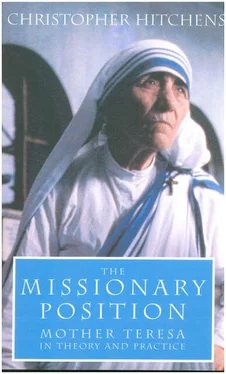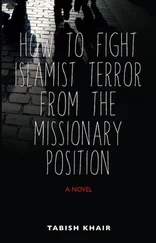Sent to cook in her hostel, tactfully named ‘The Gift of Love’ (it is for homeless men with HIV), I found a dozen or so very sick men; but those who weren’t very sick were exceptionally depressed, because they were not allowed to watch TV or smoke or drink or have friends over. Even when they are dying, close friends are not allowed. They are never allowed to drink, even (or especially) at the funerals of their friends and roommates and some have been thrown out for coming home in drag! When I mentioned the Olympics to them, they looked even more depressed. We are not watching the Olympics,’ said a sister from Bombay, ‘because we are making our Lenten sacrifice.’ When they’re very sick and very religious (which is often the case…) this doesn’t matter, but with brighter men or older men it seems intolerable.
A Guatemalan writer that I befriended there was desperate to get out, so a friend of mine who also cooks there (an African American who is a practising Catholic) adopted him for as long as she could. He became much sicker and when she begged him to go back because she couldn’t mind him, he begged her to keep him because he knew they didn’t medicate enough, or properly, and was afraid he would have to die without morphine… I am now cooking occasionally for the homeless men at the Franciscans where one of the patients, Bruce, is an ex-Mother Teresa and neither he nor the priest have a good word to say for the Sisters at ‘The Gift of Love’.
Many volunteers at hostels and clinics from Calcutta to San Francisco have comparable tales to relate. Especially impressive is the testimony of Susan Shields, who for nine and a half years worked as a member of Mother Teresa’s order, living the daily discipline of a Missionary of Charity in the Bronx, in Rome and in San Francisco. I have her permission to quote from her unpublished manuscript, In Mother’s House, which is an honest, well-written account, offered by a woman who left the Missionaries of Charity for the same reason that she joined it — a love of her fellow humans. [3] It seems to me a disgrace that such an original piece of courageous work should have failed to find a publisher when the Pope can receive an advance of around $5 million for a book he did not write.
If her memoir reads like the testimony of a former cult member, this is because in many ways it is. She relates that, within the order, total obedience to the dictates of a single woman is enforced at every level. Questioning of authority is not an option.
I was able to keep my complaining conscience quiet because we had been taught that the Holy Spirit was guiding Mother. To doubt her was a sign that we were lacking in trust and, even worse, guilty of the sin of pride. I shelved my objections and hoped that one day I would understand the many things that seemed to be contradictions.
…
One summer the sisters in the Rome novitiate were given a great quantity of tomatoes. They couldn’t give the tomatoes away because all their neighbors had grown their own. The superior decided that the sisters would can the tomatoes and eat them in the winter. When Mother came to visit and saw the canned tomatoes, she was very displeased. Missionaries of Charity do not store things but must rely only on God’s providence.
…
In San Francisco the sisters were given use of a three-storey convent with many large rooms, long hallways, two staircases and an immense basement…. The sisters lost no time in disposing of the unwanted furnishing. They removed the benches from the chapel and pulled up all the carpeting in the rooms and hallways. They pushed thick mattresses out the windows and removed all the sofas, chairs and curtains from the premises. People from the neighborhood stood on the sidewalk and watched in amazement.
The beautifully constructed house was made to conform to a way of life intended to help the sisters become holy. Large sitting rooms were turned into dormitories where beds were crowded together…. The heat remained off all winter in this exceedingly damp house. Several sisters got TB during the time I lived there.
…
In the Bronx, plans were being made to establish a new home for the poor. Many of the homeless were sick and needed more permanent accommodation than that offered by our night shelter. We had bought a large abandoned building from the city for one dollar. A co-worker offered to be the contractor and arranged for an architect to draw up plans for the renovations. Government regulations required that an elevator be installed for the use of the disabled. Mother would not allow an elevator. The city offered to pay for the elevator. Its offer was refused. After all the negotiations and plans, the project for the poor was abandoned because an elevator for the handicapped was unacceptable.
This last anecdote may be familiar to some readers, because the New York press (which is fanatically loyal to Mother Teresa, as are most branches of the journalistic profession) wrote up the incident as a case of ‘politically correct’ bureaucracy insisting on the rights of the disabled and negating the efforts of the missionaries. The truth is the exact reverse.
It might be argued that extreme simplicity, even primitivism, is to be preferred to a luxurious or corrupting style of the sort that has overtaken religious orders in the past. Ms Shields told herself things like this for years. However, she realized that, rather than a life of ascetism, theirs was a regime of austerity, rigidity, harshness and confusion. As might be expected, when the requirements of dogma clash with the needs of the poor, it is the latter which give way.
She was disturbed that the poor were the ones who suffered from the sisters’ self-righteous adherence to ‘poverty’. She knew of immense quantities of money, donated in all sincerity by people ‘from all walks of life’, which lingered unproductively in bank accounts, the size of which even many of the sisters knew nothing about. The sisters were rarely allowed to spend money on the poor they were trying to help. Instead they were forced to plead poverty, thus manipulating generous, credulous people and enterprises into giving more goods, services and cash. Ms Shields became uncomfortable with the deceit, pretence and hypocrisy — the ancient problem of the Pharisees and the too-ostentatious public worshippers:
The flood of donations was considered to be a sign of God’s approval of Mother Teresa’s congregation. We were told that we received more gifts than other religious congregations because God was pleased with Mother, and because the Missionaries of Charity were the sisters who were faithful to the true spirit of religious life. Our bank account was already the size of a great fortune and increased with every postal service delivery. Around $50 million had collected in one checking account in the Bronx…. Those of us who worked in the office regularly understood that we were not to speak about our work. The donations rolled in and were deposited in the bank, but they had no effect on our ascetic lives or on the lives of the poor we were trying to help.
Without an audit, it is impossible to say with certainty what becomes of Mother Teresa’s hoards of money, but it am possible to say what the true purpose and nature of the order is, and to what end the donations are accepted in the first place. Susan Shields again:
For Mother, it was the spiritual well-being of the poor that mattered most. Material aid was a means of reaching their souls, of showing the poor that God loved them. In the homes for the dying, Mother taught the sisters how to secretly baptize those who were dying. Sisters were to ask each person in danger of death if he wanted a ‘ticket to heaven’. An affirmative reply was to mean consent to baptism. The sister was then to pretend she was just cooling the person’s forehead with a wet cloth, while in fact she was baptizing him, saying quietly the necessary words. Secrecy was important so that it would not come to be known that Mother Teresa’s sisters were baptizing Hindus and Moslems.
Читать дальше











